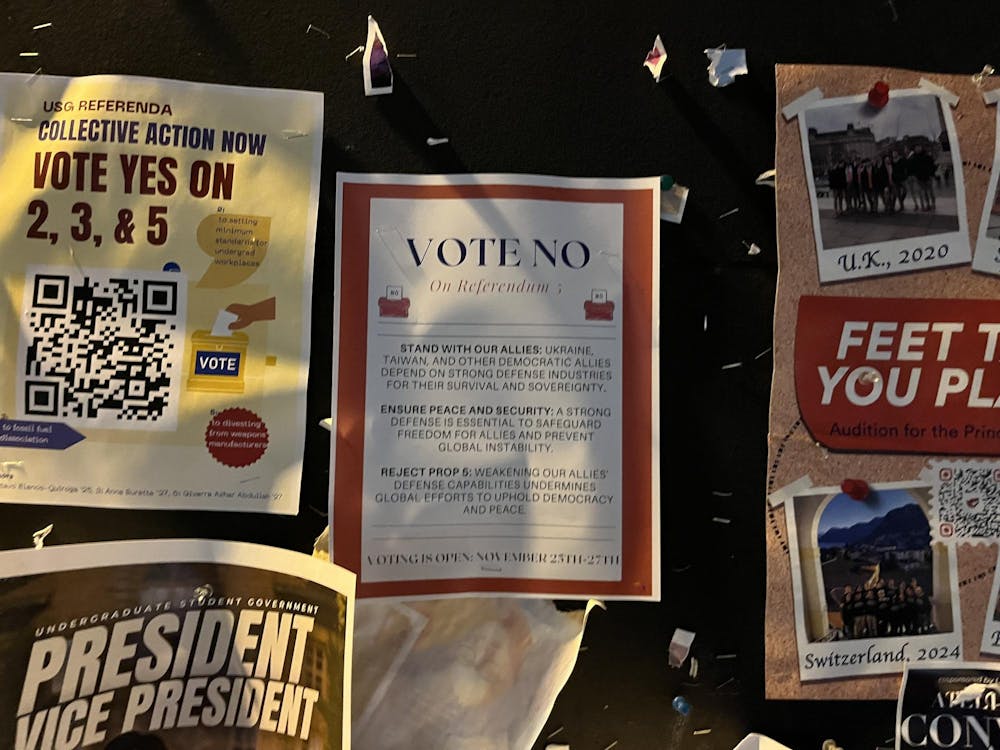I think we can all agree that no one wants war. Many of us with friends in active service — and especially those who have lost friends in combat — hope and pray for conflicts to be resolved with peace and justice as quickly as possible. Here at Princeton, I am in awe of our classmates who have served in uniform, risking their lives and dedicating themselves in the name of true service of our nation and humanity.
Unfortunately, the tragic reality is that encouraging Princeton to divest from defense companies will not end global conflicts. Referendum No. 5 fails to provide evidence directly linking the named defense companies to human rights violations or to demonstrate how weakening American defense companies will promote peace or justice. For this reason, I raised opposition to Referendum No. 5 and encourage every student to join me in voting “No.”
Referendum No. 5 calls on the University to divest from American defense companies including Boeing, Lockheed Martin, Northrop Grumman, RTX (formerly Raytheon), and General Dynamics. The referendum ignores the necessary role that these companies play in defending democracy for American allies across the world.
Referendum No. 5 is not the first effort to target these companies. Earlier this year, the People’s Republic of China (PRC) sanctioned, among others, the very companies the referendum seeks to divest from: Lockheed Martin, RTX (formerly Raytheon), General Dynamics, Northrop Grumman, and Boeing Defense. The PRC slapped sanctions on these companies on account of sales of their weapons to Taiwan — an American ally standing for democracy and freedom — by the U.S. government. These companies play a critical role in supporting global security, and Taiwan’s ability to maintain its independence depends in large part on their work.
This past summer, I witnessed firsthand how defense companies support our democratic allies. I interned at Palantir Technologies — a company that designs software to aid in combat, among other initiatives. Like many of my peers at Princeton who work at similar companies, I was drawn to Palantir’s mission-driven ethos. Although I worked on healthcare infrastructure for civil servants, I had the chance to witness Palantir’s extraordinary efforts to support Ukraine in its resistance against Putin’s aggression.
Since Russia’s invasion of Ukraine in 2022, Palantir has worked intensively with the Ukrainian military and government — including Ukrainian President Volodymyr Zelinsky himself — combining their technology with Ukrainian resilience to hold off the Russian advance. Lockheed Martin, RTX, General Dynamics, Boeing, and Northrop Grumman — the companies targeted by this referendum — have all been similarly crucial in supplying Ukraine with the means to defend itself.
In response to their support of Ukraine, Putin’s government, like the PRC, has sanctioned Lockheed Martin, Northrop Grumman, and similar American defense companies. If referendum no. 5 passes, we will follow Putin and the PRC, turning our backs on our democratic allies.
I can empathize with the sponsors of the proposed referendum. When looking at the level of carnage in the world, it is impossible not to feel grief, and to be driven to end the violence. But weakening American defense companies will not deter foreign aggressors from acting violently.

Rather, we will simply enable their violence to succeed. Without Western military deterrence, there would be no resistance to Putin in Russia, Kim Jong Un in North Korea, or Khamenei’s regime in Iran and his proxies around the Middle East. As Palantir CEO Alex Karp said about the weapons his company supplies to Ukraine: “Are these things dangerous? Yes. But either we will wield them or our adversaries will.”
And not only does Referendum No. 5 refrain from mentioning the good that defense companies do in the democratic world, but it erases any mention of the violent actors against whom such defense is necessary. Particularly troubling are the four separate clauses in the referendum description targeting Israel, in which there is not a single mention of the terrorist organization Hamas, their ruthless attacks on October 7, 2023, the hostages still held captive by Hamas, or the continued terror from Hezbollah, the Houthis, and other Iranian proxies. Nor is there an acknowledgement of the hundreds of drones and missiles Iran fired directly at Israel, or RTX’s role in designing the iron dome that intercepted those projectiles.
As I discussed in my September contribution, there are hard questions to ask regarding innocent lives lost in Israel’s pursuit of Hamas and potential paths to ending the war. But by refusing to condemn Hamas or advocate for genuine solutions, this referendum does not ask those real questions. It does not take into account Israel’s need to defend against these terror groups. While the referendum calls for divestment from American, not Israeli companies, and is not part of the Boycott, Divestment, and Sanctions (BDS) movement against Israel, it dishonestly targets Israel by erasing Hamas from the narrative.
In our fractured world of violence, we must advocate for nuanced solutions to protect and respect all peoples. This cannot conflict with our need to supply democratic allies with the tools to defend against foreign aggression.

By retaining investments in these companies, Princeton not only maintains an endowment to support financial aid, climate science research, and an expanding student body, but also invests in American defense companies that defend democracy and justice around the world.
Judah Guggenheim is the Opposition Leader against Referendum No. 5, and a COS B.S.E. major from the Class of 2025. He can be reached at judahguggenheim[at]princeton.edu.








